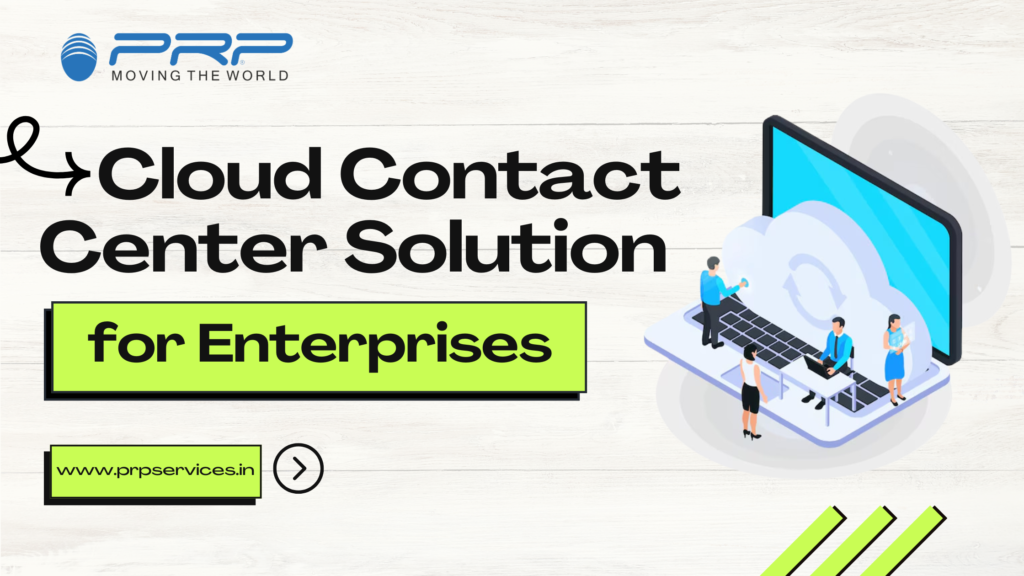In today’s business environment, enterprises are constantly searching for ways to enhance customer interactions while keeping operational costs low. Contact center solutions on the cloud can help here. By using the power of cloud technology, enterprises can provide seamless, scalable, and efficient customer service.
What Is a Cloud Contact Center Solution?
A cloud contact center solution is a centralized platform hosted on the cloud that enables businesses to manage customer communications across multiple channels. Unlike traditional on-premises contact centers, cloud solutions require no physical infrastructure, as everything is hosted online. This allows businesses to operate more flexibly and scale their operations quickly.
Cloud contact centers support various communication channels, including:
- Voice calls
- Emails
- Live chat
- Social media
- SMS
This multi-channel approach ensures that customers can connect with businesses through their preferred medium, enhancing customer satisfaction and loyalty.
Why Should Enterprises opt for Cloud Contact Centers?
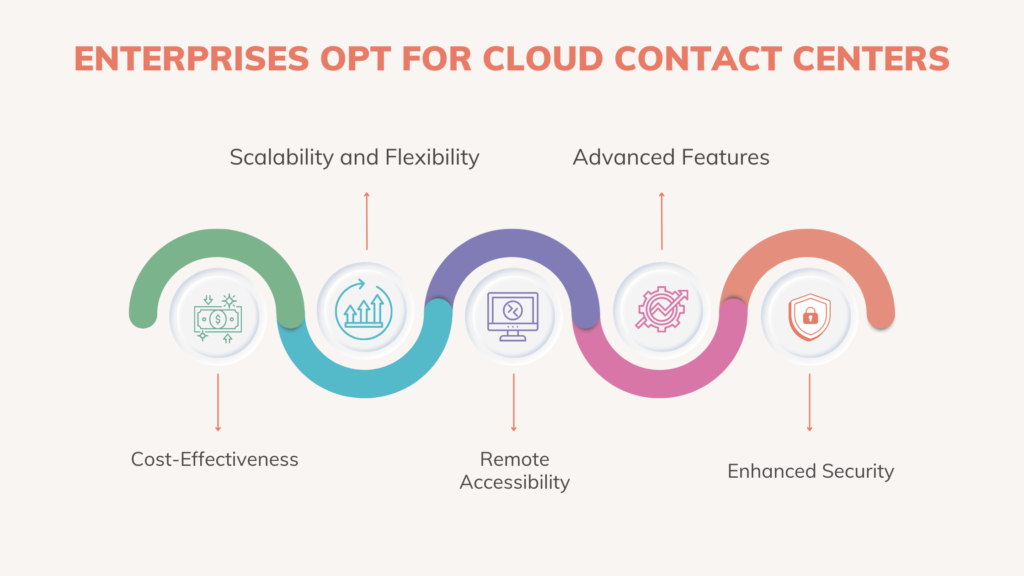
✅Cost-Effectiveness: One of the primary reasons enterprises shift to cloud contact centers is the significant cost savings. Since the solution is hosted on the cloud, businesses can avoid the high upfront costs of hardware, servers, and maintenance. Instead, they pay a subscription fee based on usage, making it a more budget-friendly option.
✅Scalability and Flexibility: Cloud solutions are inherently scalable. Enterprises can easily adjust their capacity to handle fluctuations in customer demand. For instance, during peak seasons or promotional events, businesses can quickly add more agents or communication channels without hassle.
✅Remote Accessibility: cloud contact centers provide the advantage of accessibility from anywhere. Agents only need a stable internet connection to log in and start serving customers, making it ideal for remote or hybrid work setups.
✅Advanced Features: A cloud contact center offers advanced features such as:
- AI-driven chatbots to handle routine inquiries.
- Omnichannel routing to streamline customer interactions across platforms.
- Real-time analytics and reporting for data-driven decision-making.
- These features empower enterprises to deliver personalized and efficient customer service.
✅Enhanced Security: Cloud contact center providers prioritize data security by implementing encryption, multi-factor authentication, and compliance with regulations like GDPR. This ensures that sensitive customer information is well-protected.
key features of a cloud -based contact center
A durable cloud contact center solution should include the following features:
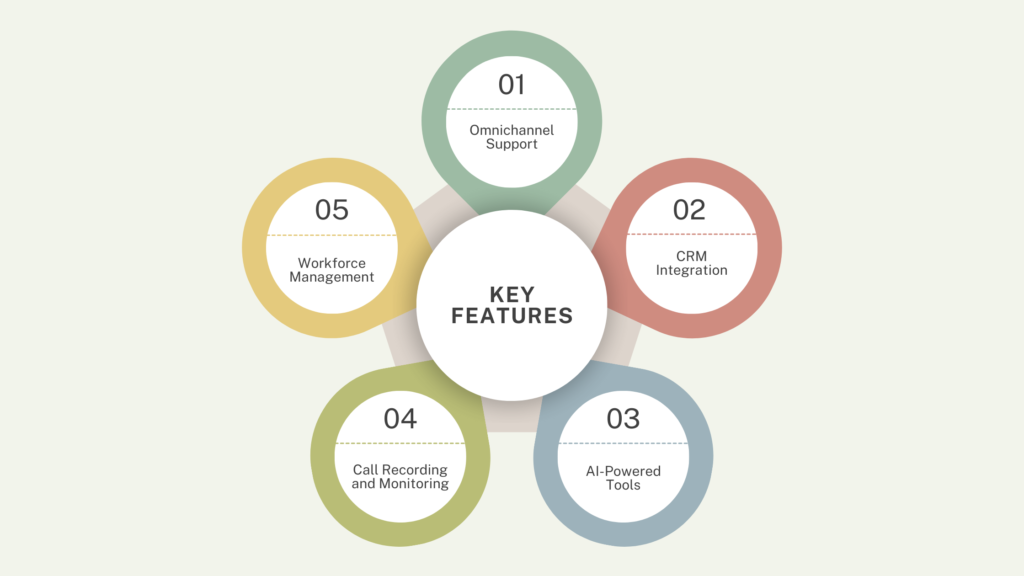
- Omnichannel Support: Seamless integration of multiple communication channels allows businesses to provide a unified customer experience. For example, a customer inquiry on social media can be continued over email without losing context.
- CRM Integration: Integration with Customer Relationship Management (CRM) software ensures that agents have access to detailed customer histories and preferences, enabling more personalized interactions.
- AI-Powered Tools: Features like AI chatbots, predictive dialing, and sentiment analysis help automate routine tasks and provide actionable insights into customer behavior.
- Call Recording and Monitoring: Cloud contact centers offer tools for recording and monitoring calls for quality assurance and training purposes. This helps maintain high service standards.
- Workforce Management: Scheduling, tracking, and managing agent performance becomes simpler with integrated workforce management tools.
How Does a Cloud Contact Center Work?
Cloud contact centers operate through an internet connection. Here’s how it works:
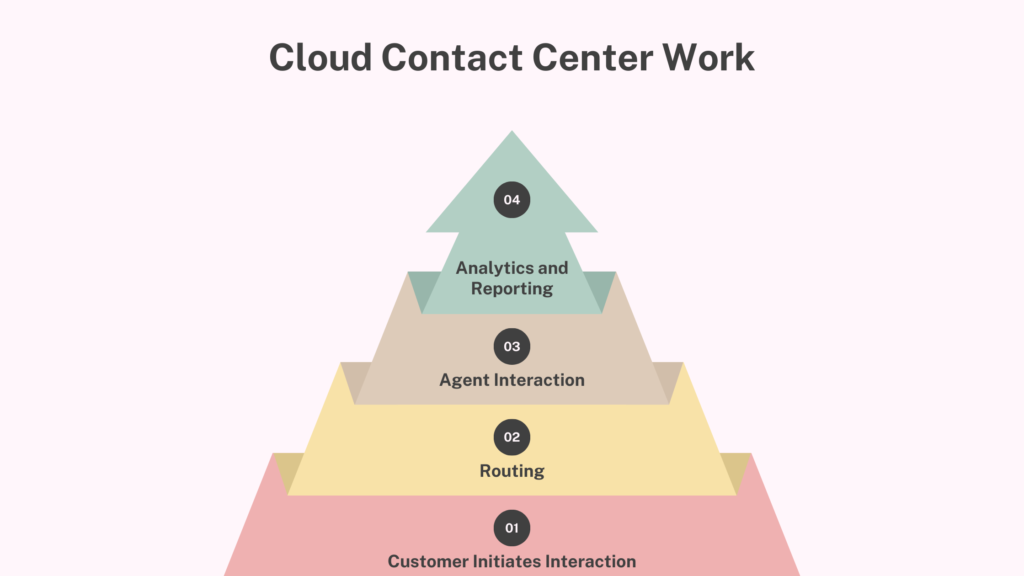
- Customer Initiates Interaction: A customer contacts the business through their preferred channel (e.g., phone, chat, e-mail).
- Routing: The cloud solution routes the inquiry to the most appropriate agent or department based on predefined rules.
- Agent Interaction: The agent accesses customer information and interacts with the customer using the cloud-based dashboard.
- Analytics and Reporting: After the interaction, the system captures and analyzes data to provide insights for future improvements.
Benefits of Cloud Contact Center Solutions for Enterprises
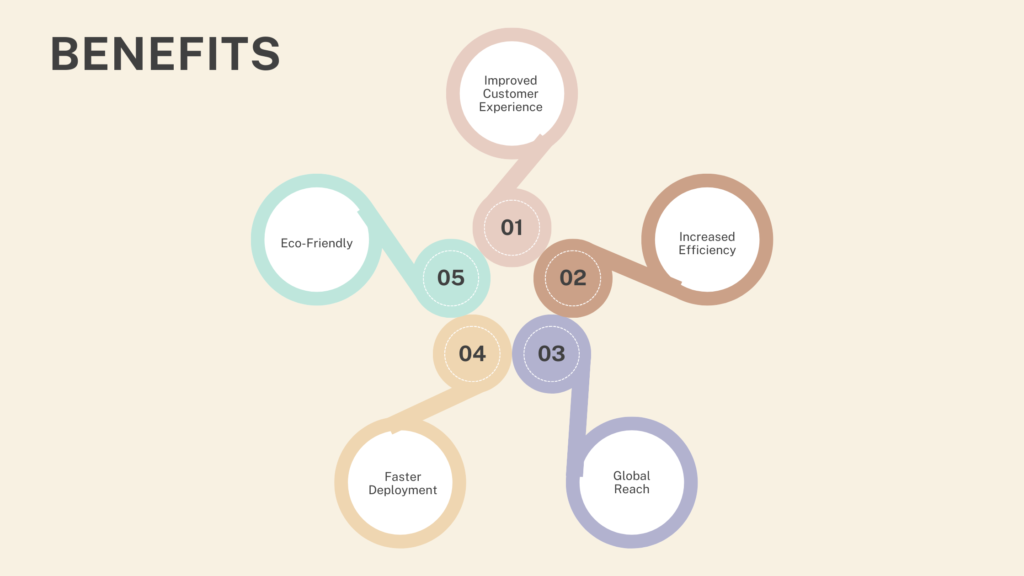
- Improved Customer Experience: With omnichannel support and personalized service, customers feel valued and are more likely to remain loyal to the brand.
- Increased Efficiency: Automation and AI-driven tools reduce manual tasks, allowing agents to focus on more complex inquiries. This boosts overall efficiency.
- Global Reach: Since the solution is hosted on the cloud, enterprises can support customers across different regions and time zones without requiring physical contact centers.
- Faster Deployment: Unlike traditional systems that can take weeks to set up, cloud contact centers can be deployed quickly, ensuring minimal downtime.
- Eco-Friendly: By eliminating the need for physical infrastructure, cloud contact centers contribute to reducing carbon footprints, aligning with sustainability goals.
Why Choose PRP Services Pvt Ltd as a cloud contact center provider?
PRP Services Pvt Ltd stands out as a trusted provider of cloud contact center solutions. Here’s why enterprises choose PRP Services Pvt Ltd:
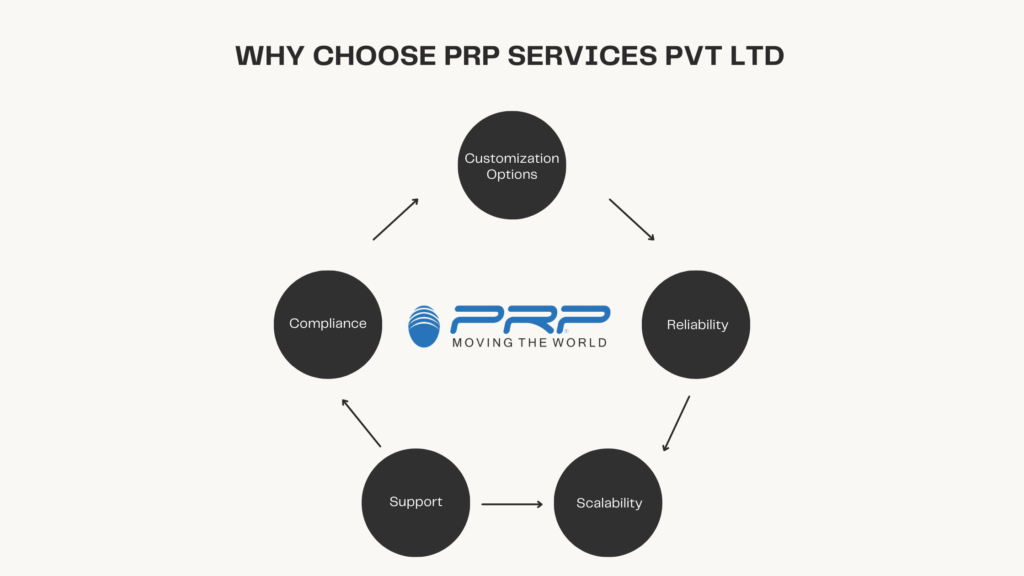
- Customizable Solutions: PRP Services ensures that your unique business requirements are met with tailor-made solutions.
- Proven Reliability: With an excellent uptime record and robust disaster recovery plans, PRP Services guarantees seamless operations.
- Scalable Offerings: Whether you’re a small enterprise or a large corporation, PRP Services’ solutions grow with your business needs.
- Comprehensive Support: PRP Services provides 24/7 customer support and thorough training to ensure a smooth transition.
- Compliance Excellence: The company adheres to global security standards and regulations, ensuring your data is always secure.
With PRP Services Pvt Ltd, enterprises can transform their customer communication strategies and achieve exceptional results.
Frequently Asked Questions
A traditional contact center requires on-premises hardware and infrastructure, while a cloud contact center operates entirely online, offering flexibility, scalability, and cost savings.
Yes, cloud contact centers are ideal for remote or hybrid teams as they can be accessed from anywhere with an internet connection.
Reputable providers prioritize security through encryption, multi-factor authentication, and compliance with global standards like GDPR.
Costs vary depending on features, number of users, and provider. Typically, businesses pay a subscription fee based on usage.
Industries like e-commerce, healthcare, finance, and telecommunications benefit greatly due to their high customer interaction volumes and need for seamless communication.
Conclusion
Cloud contact center solutions are revolutionizing the way enterprises manage customer communications. With their scalability, flexibility, and advanced features, these solutions provide a cost-effective and efficient way to enhance customer experience. By choosing the right provider, businesses can ensure seamless operations while staying ahead in a competitive market.

